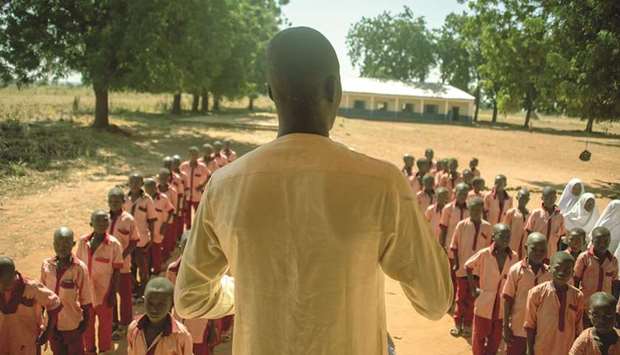Promoting healthcare and education amongst the world’s most vulnerable communities, and funded by the Qatar Fund for Development (QFFD), Education Above All Foundation (EAA) and Gavi, the Vaccine Alliance, have entered into a partnership agreement to launch an integrated immunisation project in Nigeria, a country with the highest percentage of unimmunised children in the world.
The initiative aims to raise immunisation coverage and ensure a healthy and prosperous future for children and families in Nigeria, the EAA has said in a statement.
Coinciding with the EAA’s ongoing education project with Unicef and co-funded by the QFFD, the immunisation project will be implemented in 12 local government areas across two Nigerian states – Kebbi and Sokoto.
The project aims to reach more than 100,000 women and children, and is due to be completed by December 31, 2021, the statement notes.
In this context, QFFD director-general Khalifa bin Jassim al-Kuwari said: “The world will always be grateful for Qatar’s qualitative initiatives through the Qatar Fund for Development, as it comes at the forefront of countries interested in strengthening international co-operation and partnership towards achieving sustainable development goals and critical issues of development and humanitarian priority, in particular Qatar’s continuous efforts to contribute with the international community to efforts to combat the (coronavirus) pandemic.”
He noted that this support comes within the framework of His Highness the Amir Sheikh Tamim bin Hamad al-Thani’s announcement of Qatar’s pledge of $20mn in support of Gavi, wherein His Highness the Amir called on the international community for joint action to ensure justice in providing the necessary medicines and medical equipment to all countries.
His Highness the Amir also reiterated Qatar’s support to the World Health Organisation (WHO) for co-ordinating efforts to combat the coronavirus pandemic and strengthen the global preparedness to confront infectious diseases in the future.
EAA chief executive Fahad al-Sulaiti said: “We are pleased to enter into this agreement with Gavi to provide immunisation to children and women, particularly at a time when both the right to education and healthcare have been jeopardised globally due to the coronavirus pandemic.“
Dr Mary J Pigozzi, executive director of EAA’s Educate A Child Programme, said: “Strengthening health systems directly supports increased school attendance, thereby bolstering the prospect of achieving the UN Sustainable Development Goals in both the health and education sectors.”
“Education plays a crucial role in raising awareness of immunisation and shaping the attitudes and behaviours that can make a difference,” added Gavi chief executive Dr Seth Berkley. “We look forward to working closely with Education Above All Foundation to strengthen our immunisation efforts in Nigeria.”
In Nigeria, there are more than 4.3mn unimmunised children.
Similarly, there are many challenges in the country’s education system.
Nigeria accounts for more than one in six out-of-school children (OOSC) globally.
Although primary education is officially free and compulsory, an estimated 10.1mn children between the ages of 5-14 years are not in school.
Utilising an integrated approach in providing access to education and health services for marginalised communities allows each partner to build on existing investments in support of corresponding UN Sustainable Development Goals (SDGs) for health (SDG3) and education (SDG4), with the recognition that future students are more likely to enrol and remain in school if they are healthy.
A major focus of this education and immunisation project is to foster collaboration between existing community structures within the EAA-Unicef programme, including Mothers’ Associations, Girls for Girls Clubs, the Primary Health Centre and others, to reach children, their families and communities with vital services, the statement points out.
This project will roll out a system of monitoring the immunisation status of schoolchildren and their younger siblings, in addition to an e-system for individual learner tracking and reporting.
It will also educate communities on the importance of immunisation and enable local government, community leaders, health workers, teachers and children to improve immunisation and school attendance levels, it adds.
Since 2015, EAA has worked with Unicef in Nigeria to bring out-of-school children to education, with the aim of enrolling more than 500,000 OOSC in primary school to improve retention rates and strengthen the quality of teaching and education at the overall primary level.

Nigeria accounts for more than one in six out-of-school children globally. (Picture used for illustrative purposes only)
